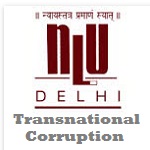Since the rise of globalization of trade, and advancement in communication technology, cross border transactions conducting with ease especially by the developing countries to improve their economical status in the international aspects, as well as for other consequential benefits which include eradication of unemployment, and establishment of industrial sectors and development of infrastructure nationwide to attract foreign direct investments in major industrial sectors of the nation, however, on the other side, these mode of transactions are giving more chances for the perpetrators to transfer their illegal funds to international accounts in the form of money laundering. The perpetrators spreading over their activities across the world illegally with the use of a simple but dangerous mechanism called corruption. Corruption has now emerged as giant monster, restraining the development of the nation. As we see corruption is not only confined to one nation, it has spread its roots all over the world and causing huge negative impact on trade relationships between the countries. Every nation’s prime concern today is fight against corruption and targeted to eliminate root cause from their nation. It is very difficult to identify the organized crime as it constitutes various activities that occur in different countries, and result in involvement of multiple jurisdictions with different laws. Cognizance over these kinds of offences would be more difficult to establish and therefore prosecution of offenders has became hardly a probability. Now, it is high time for every country to think about international conventions and agreements to enable them to share the crime information to defend and prosecute the offenders of the white-collar crimes especially corruption. Corruption in current scenario is not one nation’s problem but a global phenomenon, as it is not confined to the territorial jurisdiction of one nation, and even has transnational implications and impacts. Inter-American Convention Against Corruption, the first convention addressed the corruption, adopted in 1996, still remained regional, however, on 31-10-2003, an international convention United Nations Convention Against Corruption (UNCAC) was adopted that came into force on 14-12-2005. Prior to adoption of global convention, United Nations Convention against Transnational Organized Crime (UNTOC), adopted in 2000 contains provisions on corruption (Articles 8 and 9). These international agreements are primarily focused on criminalization, prevention, and international cooperation. Corruption destructs nation’s economy and development, corruption activities slowly would result in failure in providing basic services like education and health care. Many nations recognized the implications of corruption and therefore, decided to strengthen their rule of law through anti-corruption initiatives.
India found herself amidst of the most corrupted countries, has taken initiative to adopt the UNCAC on 12-05-2011, and became the 152nd country to ratify the said convention. India by means of ratification to the convention confirmed its commitment towards eradicating the corruption through administrative legal reforms. In the recent times, Shri Narendra Modi Government given reassurance on the same by constituting Special Investigative Team (SIT) to bring back the money illegally stockpiled in foreign countries and to utilize the same for the benefit of the country.
In this backdrop, an effort has been taken by the Centre for Transparency and Accountability in Governance, National Law University Delhi, India in collaboration with Transparency International India, New Delhi, an Indian company of Berlin based Transparency International, an international civil society organization, decided to organize an event by name “International Conference on Transnational Corruption: Challenges and Resolutions” on 14 and 15 of March 2015 to discuss various weapons or tools to eradicate the menace of corruption across the world. The conference should cover mainly on the following topics:
- The United Nations Convention against Corruption, 2003 especially on Preventive measures to control corruption, Criminalisation of corruption, International Cooperation to tackle Corruption, and Asset Recovery;
- Recognition of facets of corruption as crime across the globe
- Role of the International Administrative Agencies in controlling corruption: UN, WTO, International Courts, and other bodies
- Role of International forums/NGOs/Societies in sensitisation and controlling corruption: Transparency International India, Transparency International, Commonwealth Human Rights Initiative, etc
- Nations responsibility for corruption
- Corruption and Human rights in the international aspects.
- Avoidance of double tax agreements and corruption
- Lobbying for public procurement of goods and services and policies on trade relaxation.
- Liberalization Privatization and Globalization and Corruption in Development
- Money laundering and corruption
- Multilateral initiatives for controlling corruption
Any other topic related to the main theme of the Conference.
All national and international stakeholders are invited to participate in the conference to address the methods to eliminate the corruption across the globe
Mentors for the said Conference were professors from various reputed National law schools.
Professor (Dr) Ranbir Singh, Vice-Chancellor of National Law University Delhi, India has been designated as Patron-In –Chief for the said event. Mr. Prof. (Dr) G S Bajpai, Professor and Registrar, National Law University Delhi, has been appointed as Patron and Dr. Jeet Singh Mann, Director, Centre for Transparency and Accountability in Governance, NLU Delhi, appointed as Conference convener.
Interestingly, for the said conference, organizers invited research papers including field studies on the subject matter from scholars, researchers, bar & bench, teachers. NGOs/civil societies and students are invited. For the submission, one co-author is permitted, however, he is required to pay the registration fees. Editorial Boards decides on whether the papers could be a part of the conference. Papers would be subjected to anti-plagiarism software and to be submitted in the form of booklet in the name of “Transnational Corruption” with ISBN code.
Guidelines with some specifications for submission of research papers given in the invitation for the conference. Also important dates for submission of research papers given starting from 15th November 2014 to 15 February 2015. Research Papers to be sent to ctag@nludelhi.ac.in.
Registration charges would be remitted on or before 07-03-2015. Other information will be available at www.nludelhi.ac.in. It is notified by the organizers that registration fee from foreign delegates and their accommodation not entertained by them. Certification for actual participation in conference will be given via email.
by Anitha Gutti

